|
||||||
| أرشيف المنتدى هنا نقل الموضوعات المكررة والروابط التى لا تعمل |
|
|
أدوات الموضوع | ابحث في الموضوع | انواع عرض الموضوع |
|
#2
|
||||
|
||||
|
Saturday 24 August 2013 21.43 BST Did Assad's ruthless brother mastermind alleged Syria gas attack? Shadowy figure of Maher al-Assad could have been involved in alleged atrocity that hit rebel-held district of Damascus 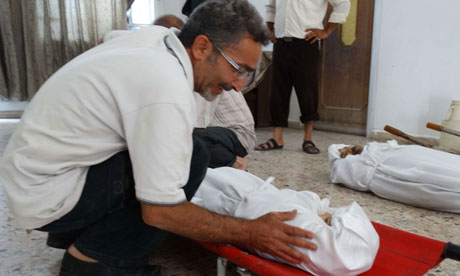 A Syrian man weeps over the body of a relative killed in what rebels claim was a regime-led chemical attack on civilians. Photograph: Ammar Al-Arbini/AFP/Getty He hasn't been seen for over a year, remaining in the shadows while Bashar al-Assad has been the public face of Syria. But Maher al-Assad has in many ways played a more decisive role in the country's civil war than his elder brother, commanding its most formidable military division as it claws back losses and leading the defence of Damascus against an opposition that remains entrenched on the capital's outskirts. The question many Syrians are asking, after last week's revelations of an apparent chemical attack on civilians in rebel-held areas, is what role the president's brother may have played in the atrocity. Maher has remained a senior member of the Ba'ath party's central committee and a central pillar of a police state that, despite the ravages of war and insurrection, remains one of the most effective in the world. As the trajectory of Syria's war has wobbled throughout the past year, opposition gains in parts being offset by regime advances elsewhere, the 4th Armoured Division Maher commands has been a chief protagonist on behalf of the regime.He has acted as division commander since at least 2000, and at the same time leads Syria's other premier fighting force, the Republican Guards. Both units have been at the vanguard of the war since its earliest days, and were active again last week as loyalist forces launched their biggest operation yet to root out rebel groups from the capital. It was while this operation was under way that thousands of residents of east Ghouta were exposed to what scientists increasingly believe was a nerve agent, possibly sarin. Attempts to pin down who was responsible for the attack are now the subject of a global intelligence effort that has already started to zero in on loyalist military units as the likely suspects. In the days since, Syria has persistently denied having used its stocks of sarin to shell the area. The 4th division has remained relatively unaffected by desertions and defections that plagued other divisions in the first 18 months of the war. Until about then — 18 July last year — Maher was visibly in charge. Frontline troops saw him often, especially in the hotspots of what was then more an insurrection than the full-blown civil and proxy regional war it is now. In Deraa he personally led a siege by 4th division troops in March 2011, in response to a spark of defiance by a group of schoolboys, who wrote on a mosque wall calling for Bashar to leave. The division left an unambiguous calling card. "He came to see us one weekend down there," said a former 4th division conscript who fled to Istanbul soon afterwards. "He told us not to shoot at the men with guns, because they were with us. He told us only to shoot at people without guns, that they were the terrorists. "It took me a while to protest at that. He made us shoot at their hearts and heads. And anyone that was shooting high and wide [deliberately] would be beaten, or killed." In Jordan's Zaatari refugee camp, only nine kilometres south of Deraa, which is now home to a sizeable chunk of the city's residents, Maher's name is spoken of with visceral anger. "His brother is a puppet for Maher and the Iranians," said Khaled Othman, a plumber from the city, standing in the flap of a UN supply tent. "Maher is the devil. He personally tried to annihilate us just because we defied him. He took pleasure in it, along with his closest officers. Did you see the video of him in the prison?" The refrain is commonly asked in communities that support the Syrian opposition. It refers to a prison revolt in 2008 that Maher was asked to put down; a task he carried out with brutal efficiency, killing many who had taken guards and soldiers hostage, then filming the bodies with his camera phone. The phone video is often showed by supporters of the Assad regime as purported evidence of the strength of the brothers. But between the statesman and the general, it has been Maher who has inspired more fear — and speculation. His last appearance in public was several weeks before an explosion in a meeting room in central Damascus killed security chief, and the Assads' brother-in-law, Assef Shawkat, who had married their sister, Bushra. Also killed that day was the defence minister and several other members of the inner sanctum. Rumours have circulated since that Maher was also in the room at the time and was wounded. Last year Abdullah Omar, a former press officer in the presidential palace who defected in September, said he had seen Maher visit the palace and he had appeared to have lost part of a hand and leg. The suggestion has not since been confirmed. Turkish officials believe that the younger Assad was wounded that day — one of the few times that the opposition has got so close to the seat of power. "But he is alive and functioning," said one senior Turkish diplomat. "And the 4th division is still one of their better units." In Lebanon, where in more settled times leaders from all sides of politics beat a regular path to Damascus, there has been nothing from Maher for more than a year. "We know his wife is in Dubai along with Bushra," said the leader of one political bloc. "And we know that Bashar will have a hard time keeping him in his box. If they think they are winning, they will behave without any restraint. And if they did the chemical attack, he won't be far away from |
|
#3
|
||||
|
||||
|
Syria chemical attack puts focus on international community's paralysis
Assad regime's likely use of nerve gas reveals west to be ever more reluctant to become entangled in crisis Wednesday 21 August 2013 18.35  People visit a morgue in Damascus to identify victims of the suspected chemical attack in Ghouta. Photograph: Erbin News/Demotix/Corbis There are many aspects about the latest reported chemical weapons attack in Syria, on the outskirts of Damascus, that are not in doubt. While the numbers have yet to be nailed down precisely, it is clear that something horrific and large-scale took place. The attack was consistent with some previous reports of use of chemical agents by the Assad regime – allegations of a mixed attack using a combination of conventional and chemical munitions. The symptoms, too, appeared largely consistent with the use of a toxic gas. While there have been caveats about exactly what was used, it seems clear that something terrible did occur in Ghouta and that the most likely candidate must be the regime of Bashar al-Assad. More puzzling is the question of why the Assad government might want to escalate the conflict now using chemical weapons only days after the arrival of a UN chemical weapons inspection team. ****ysts had, in recent months, noted a relative drop-off in the numbers of reported chemical weapons attacks alleged to taken place in Syria. One theory that has been put forward to explain this is that forces loyal to Assad have been enjoying relative successes on the battlefield recently and have had no need to pursue such a tactic. It goes on to suggest that the emerging Syrian doctrine for use of chemical agents – as has been described by at least one defector – is that is that they are designed to be confusing, ambiguous (for instance a chemical weapon mixed among conventional rounds) and, above all, to disrupt "the psychic equilibrium" of rebel-held areas rather than cause death on a Halabja-like scale. But if it is confirmed that multiple locations were hit in the early hours of Wednesday, with large numbers of casualties, the attacks in Ghouta would suggest something very different indeed. Given that the balance of probability suggests that the regime did use the weapons, one possible explanation suggests a profound shift in both the regime's ****ysis of the likelihood of a meaningful international response and a further worrying development in the Syrian military doctrine for the use of chemical weapons. One thing that is certain is that the civil war in Syria no longer exists in a vacuum as something discreet and confined within the country's borders. As it has become more complicated, drawing in both jihadists and threatening to destabilise the wider region, exacerbating already existing tensions between regional players, the west has appeared ever more loth to become entangled, reneging on previous promises – not least by President Barack Obama – that widespread chemical weapons use would be a red line. International paralysis over the coup in Egypt and growing instability in Libya, and growing tension in Tunisia, is likely to have confirmed the view in Damascus that there is little appetite for intervention. On the ground Ghouta, too, has been a persistent problem, threatening the capital, and apparently resilient to regime efforts to retake it, perhaps encouraging more extreme tactics. Another explanation put forward on Wednesday is that as much as Ghouta itself, the intended recipient for the message of the attack was the wider community in Syria still backing the rebels. That it was designed to dramatise just how weak and divided the international community is over Syria and emphasise the frightening notion that the regime can act with ever more impunity. As ever, though, it will be the hard-to-know but crucially important details that need to be established to understand what this latest atrocity means. Little is known about the cohesion of the Syrian military and its political command and control; for instance how much leeway individual commanders have over what weapons they use and in what way. One thing is certain: whoever and ordered this attack, and for whatever reason, it will feed into a dangerously escalating sense of conflict enveloping the wider region, and that is very frightening indeed. |
|
#4
|
||||
|
||||
|
Syria crisis: US deploys warship as hospitals report poison gas symptoms
Extra missile warship deployed to Mediterranean as chiefs of staff head to Jordan for summit Saturday 24 August 2013 20.44 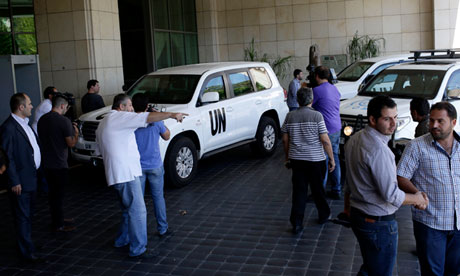 The UN high representative for disarmament affairs, Angela Kane, arrives at a hotel in Damascus, Syria, on 24 August 2013 Photograph: Hassan Ammar/AP The US navy is deploying an extra missile warship to the eastern Mediterranean ahead of a summit to debate last week's chemical weapons attack in Syria, as calls mount for a military response. The summit, to be held in Jordan's capital Amman in the first half of the week, has been called as a consensus emerges that the nerve agent sarin was the cause of hundreds of deaths in rebel-held east Damascus early on Thursday. Biological samples taken from victims and survivors of the attack have now been passed to western officials in Jordan after having been smuggled out of Syria over the past 72 hours. Unmarked questionnaires have been distributed to officials in the three most affected communities, asking for forensic and environmental details, as well as for organ tissue and clothing worn by victims. A final death toll has not been established, with estimates ranging from several hundred to more than 1,400. Three hospitals in Syria's Damascus governorate which are supported by the international medical humanitarian organisation Médecins sans Frontières reported that they received approximately 3,600 patients displaying neurotoxic symptoms in less than three hours on the morning of Wednesday, 21 August. Of those patients, 355 are reported to have died. Officials, who have not identified themselves but claim to be part of an international response, have also made phone contact with rebel officials, seeking photographs of the rockets that are thought to have carried the gas. The remains of 20 such rockets have been found in the affected areas, activists and local residents say. Many remain mostly intact, suggesting that they did not detonate on impact and potentially dispersed gas before hitting the ground. Survivors spoken to by the Observer last week say they heard the rockets whistling in but they did not detonate. Several have been photographed half buried in bitumen, which suggests that they did not carry a warhead or, if they did, it failed to explode. France, Britain and Turkey have blamed the Syrian regime for the attack, which came as its military forces were advancing into the area. France's foreign minister, Laurent Fabius, said on Saturday that "all the information at our disposal converges to indicate that there was a chemical massacre near Damascus and that the [regime of Bashar al-Assad] is responsible". The foreign secretary, William Hague, said last week that "this is a chemical attack by the Assad regime" and it was "not something that a humane or civilised world can ignore". Barack Obama has described the incident as "grave" and asked intelligence officials to prepare a detailed assessment. Syria has continued to deny responsibility as the UN's disarmament chief, Angela Kane, arrived in Damascus to try to negotiate access to the site of the attack for an inspection team that was sent to investigate three earlier alleged attacks. The team has been in the capital for the past six days and has been pressing for permission to make the journey – only a short distance from their hotel – for the past 72 hours. Rebel groups in the area say that they will guarantee safe passage. However, the Syrian government has not agreed and the UN fears that the journey is unsafe without a negotiated agreement. Syrian state television said on Saturday that its forces had found tunnels in rebel areas in which chemicals were stored. The images of dead and dying in the attack have caught the attention of regional governments like nothing else in the two-and-a-half year conflict. The chairman of the US joint chiefs of staff, General Martin Dempsey, will travel to Jordan along with the head of the US central command, General Lloyd Austin, and chiefs of staff from Turkey, Britain, France, Qatar, Canada, Saudi Arabia, Italy and Canada. The addition of a US destroyer takes to four the US Mediterranean flotilla, one more than normal. US defence secretary Chuck Hagel said no decision has been made to use the warships in operations against Syria. Speaking on Friday, officials in Washington said no response to Syria would involve sending troops into the country. Two of Syria's three main allies, Russia and Iran, have supported calls for a transparent and credible inquiry into the attack. Both accuse rebel groups of having carried out the atrocity. The Lebanese militia, Hezbollah, has remained silent since Thursday. Hezbollah leaders roundly condemned car-bombings of two mosques in Lebanon's second city, Tripoli, one day later, which killed 42 and wounded hundreds. The mosques had been focal points of anti-Assad rhetoric in the largely Sunni north. Lebanon, an unstable multi-confessional state, has been perenially on edge since the start of the Syrian uprising with occasional flare-ups in violence that threaten to drag it into the chaos consuming its powerful neighbour. |
|
#5
|
||||
|
||||
|
Syria conflict: chemical weapons blamed as hundreds reported killed
Death toll claimed to be as high as 1,400 as Syrian government admits launching offensive but denies using chemical weapons Thursday 22 August 2013 Link to video: Syria: footage shows horrific aftermath of alleged gas attack Hundreds of people are believed to have been killed in an apparent gas attack on rebel-held parts of eastern Damascus that is thought to be the most significant use of chemical weapons since thousands of Kurds were gassed by Saddam Hussein in Halabja 25 years ago. Medics, as well as opposition fighters and political leaders, said the death toll had reached 1,400 and was likely to rise further with hundreds more critically wounded in districts besieged by the Syrian military. Other estimates put the current death toll at between 200 and 500. None of the figures could be independently verified. On Thursday morning rebels said new bombardments of rockets and mortars struck neighbourhoods hit by the gas attack. The Syrian government acknowledged it had launched a major offensive in rebel-held districts in the east of the capital – described by pro-regime media as the biggest since the start of the civil war – but strongly denied using chemical weapons. "These are lies that serve the propaganda of the terrorists," a Syrian official said, referring to the armed opposition. "We would not use such weapons." However, George Sabra, the head of the main Syrian opposition group, laid the blame squarely at the Assad regime, saying the scenes "constitute a turning point in the regime's operations". "This time it was for annihilation, rather than terror," he said. 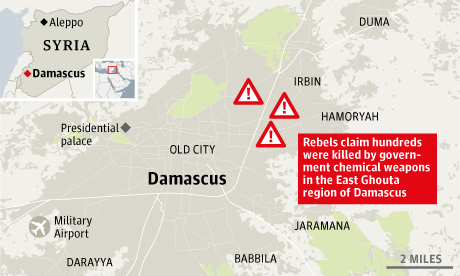 Location of Wednesday's attack. Credit: Guardian graphics International reaction intensified throughout the day. The UN security council called an emergency session and the White House formally requested the UN to investigate the attack. William Hague, the foreign secretary, said the UK was "deeply concerned". The UN secretary-general Ban Ki-moon called for "a thorough, impartial and prompt investigation" of allegations of chemical weapons use. UN deputy spokesman Eduardo del Buey said earlier that the secretary-general was "shocked" at the alleged use of chemical weapons and is determined to ensure a "thorough investigation" of all reported incidents. After a two-hour, closed-door meeting, the council president said there was "strong concern" about the allegations "and a general sense that there must be clarity on what happened." A UN inspection team arrived in Damascus this week to look into earlier claims of chemical weapon use, but was granted permission to enter Syria with a limited mission to investigate only three specific sites. An expanded mandate to investigate Wednesday's attack in eastern Ghouta – only 10 miles from the team's hotel – must be sought by the UN secretary general and then approved by Syria. The US moved quickly to make the request. The White House said: "For the UN's efforts to be credible they must have immediate access to witnesses and affected individuals, and have the ability to examine and collect physical evidence without any interference or manipulation from the Syrian government. If the Syrian government has nothing to hide and is truly committed to an impartial and credible investigation of chemical weapons use in Syria, it will facilitate the UN team's immediate and unfettered access to this site." Rescuers and victims said the shelling of eastern Ghouta started shortly after 2am and targeted three districts, Ein Tarma, Zermalka and Jobar, all rebel strongholds for the past year. "It was around 2.30am Wednesday when we received calls from Zemalka and Jobar," said a Free Syria Army (FSA) officer, Captain Alla'a al-Basha, who has documented previous alleged chemical attacks in the area. "The FSA members were asking for more forces to evacuate the civilians as the shells were coming in at around five per minute. As soon as I and my team arrived at the scene, I saw bodies scattered in the streets. I saw whole houses – none of their residents were alive. When I got there, I could smell what seemed to be burning sulphur and something like cooked eggs. The smoke was not pure white. "Most of the victims were shivering and they turned yellow. I saw a woman who was tearing at her clothes as she could not breathe. The number of the casualties that we were able to document so far is 1,228 martyrs. The doctors think that more than 20 shells were fired with fatal gases. "Most of the victims did not appear to be injured but died out of suffocation. I held a young boy whose body was like a piece of wood and his colour was very blue. He did not have any wound." By Wednesday night, more than 120 videos had been uploaded to the internet, most depicting scenes of men women and children in respiratory distress, on watery floors, and doctors describing the victims' symptoms. Other videos showed scores of bodies wrapped in white shrouds, or lying on grey concrete. White foam was bubbling from the mouth and nostrils of many victims. Some writhed in distress, apparently struggling to breathe. Doctors at makeshift clinics said they were working without oxygen and had been overrun by the number of victims, many of whom needed lifesaving treatment that they could not provide. Treatment of victims appeared rudimentary, with water and vinegar among the means of trying to dilute the effects. "We know when we have an area targeted by fatal gases we would take plastic masks and put wet cloths on our noses and mouths," said Basha. "But most of the civilians do not know that they have to do that." Sergeant Abu Ali, who runs a field hospital in the Nashabiya area of eastern Damascus, said he had received patients who were vomiting and had high temperatures, breathing problems, limb stiffness and were in comas. "We received 60 cases. Most of them were sent to the nearby farms after their situation was stabilised and those with acute symptoms were kept here. I have very few medicines and all the oxygen tubes I have had run out now. People need intensive care." One witness told Reuters: "We would go into a house and everything was in its place, every person was in their place. They were lying where they had been. They looked like they were asleep. But they were dead." Ralf Trapp, a consultant on chemical and biological weapons, said getting access to the scenes of the attacks was paramount for inspectors. "The logical thing to do would be to go in and start interviewing doctors and getting blood and urine samples. "This is the ideal moment to collect samples because it is so shortly after the attack. They may get intact agent – in the first day or so you would still find intact sarin, for example. "Within a few days, you would find degradation products. If you link those to clinical examinations and testimony, you can build up a very precise picture of what happened. "They need to try to get to the site where it happened, talk to people who were on the spot when it happened, to victims and observers, to create as complete a picture of the actual attack. They want to discriminate against other types of weapons that might cause similar effects or release something by chance." Charles Duelfer, a former US chief weapons inspector, said: "[Video] reports of doctors treating these people, that's real data." Duelfer said the scale of the attack could probably be proved by the intelligence community. "It will be pretty clear pretty quickly because various countries' intelligence apparatus will have noticed something on this scale, whether it's artillery, rockets, or shells. These are knowable things."The White House is going to be hard pressed to construct an answer to this one. It was easy to waffle a bit so long as alleged use was minor and didn't happen again, but this is really putting the administration in a corner."" |
|
#6
|
||||
|
||||
 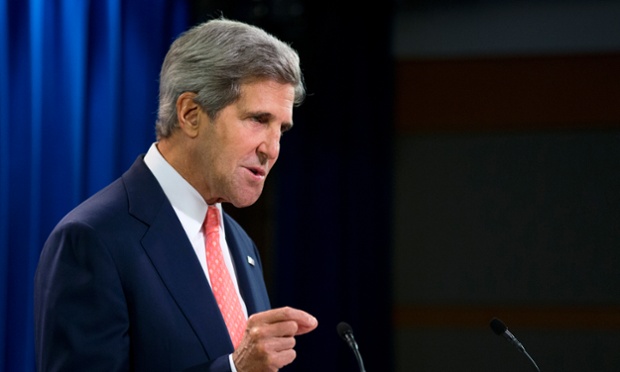 Today's focus is very much on Syria, with rapid developments on several fronts. Here's a very brief precis of where we are now: • Britain seems to be edging towards support for military action against Bashar al-Assad's rule after the foreign secretary, William Hague, said diplomatic options to halt the bloodshed in Syria appeared to have failed. Hague said Britain and it's allies could intervene without specific UN authority. • A UN team is expected to visit the site of a suspected chemical weapons attack near Damascus. Reporters saw the inspectors leave their hotel this morning. • Assad has used an interview with a Russian newspaper to deny that his forces used chemical weapons, and to predict that any foreign intervention would end in failure. And now to the inspectors, who were granted permission yesterday to visit the site of Wedesday's suspected chemical attack in the suburb of Ghouta, in which hundreds of people are reported to have been killed. Rebels, who hold the area, say the area was targeted by gas-filled shells fired by government forces. Assad has dismissed this idea as "nonsense". Reporters saw the six-car convoy of UN chemical weapons experts, clad in blue body armour, leave their hotel accompanied Syrian security forces. The US says the area concerned has faced heavy conventional shelling in subsequent days, and it is possible any evidence will have been destroyed. آخر تعديل بواسطة مستر محمد سلام ، 27-08-2013 الساعة 10:34 AM |
|
#7
|
||||
|
||||
|
UN orders its inspectors out of Syria in anticipation of strikes
US threats to launch air strikes within days trigger demand by Ban Ki-moon for early assessment of inspectors' findings 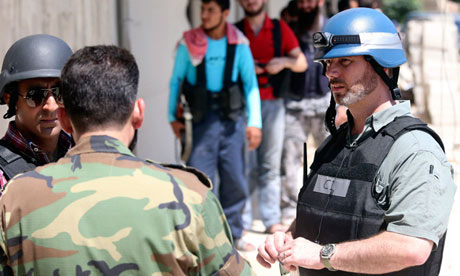 UN weapons inspectors have been ordered to leave Syria early amid mounting anticipation of US-led military strikes. As the five permanent members of the security council held a second emergency meeting on Syria in two days on Thursday evening, the UN secretary general, Ban Ki-moon, instructed the 20-strong inspection team in Damascus to leave on Saturday, a day ahead of schedule. Ban also announced that the team would report to him immediately on departure, raising the possibility that the UN could issue an interim report on the 21 August chemical attacks that left hundreds of people dead. The inspectors had not been due to deliver their findings for a week at least, with the ****ysis of samples a painstaking task. The demand for a rushed early assessment reflects the fraught atmosphere at the UN triggered by US threats to launch punitive air strikes within days. In Washington US intelligence officials were on Thursday seeking to persuade congressman of the evidence that the Syrian government was responsible for chemical weapons attacks, as the Obama administration resisted comparisons with the run-up to the Iraq war. Congressmen, currently in recess, are due to participate in "unclassified briefing" via telephone conference. Downing Street had suggested it received US assurances that the White House was willing to wait until Tuesday to give the House of Commons time for a second debate on British involvement in air strikes, but Whitehall sources have acknowledged it is possible the US could go ahead with an attack on Syria without Britain, possibly with France, where the president, François Hollande – another proponent of punitive action – is not constrained by a parliamentary system. Josh Earnest, the White House's deputy spokesman, asked about the possibility of "going it alone" at the daily briefing, repeatedly said it was in US "core national security interests" to enforce international chemical weapons norms. Earnest also provided the first formal confirmation of the kind of military offensive being considered. "What we're taking about here is something that is discreet and limited." US officials told their British counterparts they understood the demands of the UK parliamentary system, and set great store in the transatlantic "special relationship" but that other considerations including core American national interests could take precedence when Barack Obama made a final decision how to act. It is understood that one of the factors involved in the discussions within the Obama administration was the need to uphold US credibility, particularly in anticipation of a looming confrontation with Iran over its nuclear ambitions. The president appeared to hint at such considerations in a PBS television interview on Wednesday. "If we are saying in a clear and decisive but very limited way, we send a shot across the bow saying: 'Stop doing this,' this can have a positive impact on our national security over the long term," he said. Obama said he not made a final decision on air strikes but added: "We have concluded that the Syrian government in fact carried these out." Most observers said that US air strikes were still likely, even without UK participation, probably in the form of cruise missiles launched from American ships in the Mediterranean. But the parliamentary revolt in the UK and tepid support for military action in the US, provoked the first real doubts for several days that the Obama administration would carry out its threats. "If the administration can't even count on the full-throated support of our closest ally, the country that stuck by us even during the worst days of Iraq, that legitimacy is going to be called into question," said Ken Pollack, a Middle East expert at the Brookings Institution thinktank. Meanwhile, US and British government attempts to rally support for military action were damaged by the publication of an Associated Press report quoting unnamed US intelligence officials as describing the case against the Assad regime as no "slam-dunk", adding that uncertainty remained over real control over Syrian chemical weapons stockpiles. The basketball term slam-dunk, reflecting certainty of outcome, has haunting overtones in Washington as it was attributed to the then CIA director George Tenet in describing the intelligence case in the runup to the 2003 Iraq invasion for Saddam Hussein's supposed possession of weapons of mass destruction. The AP report conflicts with the assertion by the UK joint intelligence committee on Thursday that "it is not possible for the opposition to have carried out a CW [chemical weapons] attack on this scale". The report quoted "multiple US officials" as pointing towards gaps in the US intelligence picture, in strong contrast to the certainty expressed by American leaders, including Barack Obama, and said the US intelligence evidence against Syria was "thick with caveats". "It builds a case that Assad's forces are most likely responsible while outlining gaps in the US intelligence picture," AP reported. Thursday night's second meeting of the permanent five security council members – the US, UK, France, Russia and China – was called by Russia, which is adamantly opposed to military intervention. An initial discussion of a British resolution calling for a UN mandate for armed action foundered on Wednesday in the face of Russian opposition. In was not clear whether the Russians intended to bring new proposals to the table. The call for a meeting followed a telephone conversation between Angela Merkel and Vladimir Putin, in which the German chancellor called on the Russian leader to seek a consensus alternative at the UN to military action. "The chancellor called on the Russian president to use negotiations in the UN security council for a quick, unanimous international reaction," a German government statement said after the call. The accelerated departure of the UN weapons inspectors was reminiscent of similar hasty exit from Iraq more than a decade ago, after receiving a tip-off from western intelligence agencies that US air strikes against Saddam Hussein's regime were imminent. The inspectors, who have spent three days in the eastern Damascus suburbs where the 21 August mass killing of civilians took place, had so far sent none of the samples they had collected out of the country for tests, but would be carrying the samples with them when they left. Laboratory work would only begin once they had left Syria. It is possible however Ban will ask for an interim report that could provide circumstantial evidence such as witness testimonies and the identification of the weapons and delivery systems used in the attack. That could provide part of what the UN has described as an "evidence-based narrative", from which member states could draw their own inferences. It is not clear whether the head of the inspection mission, Åke Sellström, would agree to such a partial report under intense pressure from the secretary general and some security council members. آخر تعديل بواسطة مستر محمد سلام ، 30-08-2013 الساعة 12:51 AM |
|
#8
|
||||
|
||||
|
http://cdn.theguardian.tv/mainwebsit...erson-16x9.mp4
http://cdn.theguardian.tv/webM/640/2...mGAus_vpx.webm |
|
#9
|
||||
|
||||
|
Obama administration to press case on Syria but support for strikes wavers
Congressional leaders to be briefed on chemical weapons evidence as White House resists comparisons with Iraq war 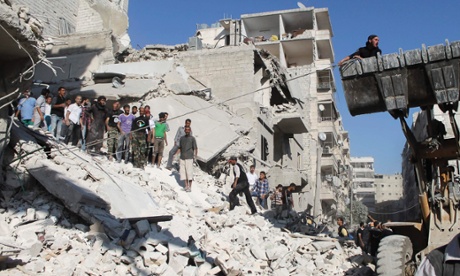 Senior US intelligence officials were seeking to persuade Congress on Thursday that the Syrian government was responsible for chemical weapons attacks, as the White House resisted comparisons with intelligence failures in the run-up to the Iraq war. Leaders of key congressional committees were due to participate in "unclassified briefing" by telephone on Thursday, amid signs that some of the support for military strikes against Syria is fading. A separate, unclassified report on the US intelligence assessment is being prepared for release to the public before the end of the week. The UK released an intelligence assessment on Thursday that said it was "highly likely" that the regime of Bashar al-Assad was responsible for a chemical attack that killed hundreds in a Damascus suburb last week. However, the document contained few specifics, and failure by the US and UK to say with absolute certainty that the attacks were conducted by the Syrian government have prompted challenging questions in Congress and led to signs of growing anxiety among traditional US allies. It has also prompted comparisons with Iraq in 2003, when the US launched an invasion on the pretext of weapons of mass destructions that were never found. "As it relates to the situation in Iraq, I don't agree these are similar situations," deputy press secretary Josh Earnest told reporters Thursday. "What we saw in that circumstance that an administration was searching high and low to produce evidence to justify a military invasion, an open-ended military invasion of another country, with the final goal being regime change," he said. "That was the articulated policy of the previous administration." Earnest said any strikes carried out by the US and its allies would be "discreet and limited". In a sign of the importance the White House is attaching to support from Capitol Hill, the briefings with "congressional leaders and the chairs and ranking members of national security committees" would be given by the secretary of state John Kerry, and secretary of defence Chuck Hagel. Obama's national security adviser Susan Rice and director of national intelligence James Clapper will also participate in the briefing. Separately, Obama personally briefed the Republican leader of the House of Representatives, John Boenher. A spokesman for Boenher said in a statement he had raised the question of the legality for any military strike and pressed him to consult further with Congress. Republican senator Jim Inhofe, the ranking member of armed services committee, said he was opposed to using force in Syria when military resources are depleted and there was insufficient evidence of regional backing. "It is vital we avoid short-sighted military action that would have little impact on the long-term trajectory of the conflict," he said. "We can't simply launch a few missiles and hope for the best." Obama was criticised for failing to consult Congress sufficiently before air strikes in Libya in 2011. However, there is no sign the White House would seek a Congressional before launching strikes. In London, prime minister David Cameron laid out Britain's case for possible military intervention in a parliamentary debate, but doubts remain over whether the House of Commons would approve a joint action with the US. In an attempt to prevent a parliamentary defeat, Cameron committed to a second vote after UN inspectors have completed their report on the chemical attacks in Damascus. France has also called for a delay to any military action until the UN inspectors complete their work. The UN secretary general, Ban Ki-moon, instructed the 20-strong inspection team in Damascus to leave on Saturday, a day before they had expected to leave. Ban also announced the team would report to him immediately on departure. Military and foreign policy experts were split over whether the US would forge ahead with cruise missile strikes against Syria. Obama, who has long been reluctant to be engaged militarily in the Middle East, is now considering the prospect of taking military action with less international support than George Bush's 2003 invasion of in Iraq. However, Earnest, the White House deputy spokesman, seemed to confirm that was a possibility when he was asked whether the US would "go it alone". Earnest repeatedly said it was in US "core national security interests" to enforce international chemical weapons norms. "The president of the United States is elected with the duty to protect the national security interests of America," he said. "The decisions he makes about our foreign policy is with our national security interests front and centre." ****ysts said that with the Arab League condemning Syria but not backing military action, and no prospect of a UN security council mandate, reluctance on the part of Britain and France could prove a problem for the US. Michael O'Hanlon, the director of foreign policy research at the Brookings Institution, said fading international support was "regrettable", the Obama administration was unlikely to pull back from the brink at this stage. Sean Kay, a Nato expert at Ohio Wesleyan University, said it looked likely that the US would attack Syria with or without the UK. "I think they're trying to make it clear they're determined to move forward," he said. Many in Washington believe military action is a fait accompli. UN weapons inspections were ordered to leave Syria ahead of schedule on Thursday ahead of schedule amid mounting anticipation of US-led military strikes. But others argue that doubts over intelligence and lack of support from key allies could delay or even lead to the abandonment of military action. Doug Bandow, a senior fellow at the Cato Institute, detected that "caution has grown" in the White House over the last 24 hours. "I think they've found over the last couple of days both a lack of support at home, both among the American people and Congress, and then they look internationally and suddenly they don't feel quite so surrounded by friends," he said. Bandow said that an "embarrassing backdown" by the US remained a possibility, and predicted that doubt in Britain, and lack of support elsewhere, would delay any strikes. Britain's joint intelligence committee (JIC) concluded it is "highly likely" that the regime of Bashar al-Assad was responsible for the chemical weapon attacks in Syria. But the assessment was mainly based on "open source" evidence such as video footage of the victims, and a judgment that the opposition does not have the capability to launch such an attack. It described the evidence base of a deliberate attack to clear opposition from suburbs in Damascus as only "limited but growing". Chairs and ranking members of key congressional committees, who have been briefed on the intelligence, have endorsed the view that Assad's forces were responsible for the attack. But all have stopped short of saying the evidence is un*****ocal. Citing "multiple US officials", the Associated Press reported on Monday that there were gaps in the US intelligence picture, which was "thick with caveats". Greg Thielmann, a former State Department intelligence ****yst, said the Syria crisis reminded him of the one preceding the Iraq war. "There are enough similarities that it makes one very nervous," he said. "This rhymes with what happened over Iraq WMD." One of the few voices of caution inside the US intelligence agencies when compiling the infamously erroneous 2002 National Intelligence Estimate on Iraq, Thielmann said that post-Iraq intelligence reforms give him confidence that the spy agencies are not overstating their case. But he raised questions about the seeming vagueness in the intelligence. "I would have thought there would be incentives inside the intelligence community to find out what's going on that the US would have gotten some samples and established a chain of custody," he said. Ken Pollack, a former CIA ****yst now at the Saban Centre for Middle East Policy, said that with continuing uncertainty over the intelligence picture, and no obvious legal mandate for military action, the US will be desperate to secure more international backing to argue intervention is "legitimate". "If the administration can't even count of the full-throated support of our closest ally, the country that stuck by us even during the worst days of Iraq, that legitimacy is going to be called into question," he said. |
|
#10
|
||||
|
||||
|
Obama strike would not weaken Assad's military strength, experts warn
White House says any strike would be 'discreet and limited' in statement intended to reflect reluctance to draw US into conflict  The Obama administration's preferred option for a potential strike on Syria is likely to leave Bashar al-Assad's government with significant chemical weapons and military infrastructure, according to military ****ysts. Although vice-president Joe Biden said on Thursday that President Obama had yet to take a final decision on attacking the Syrian regime for allegedly gassing civilians on 21 August, administration statements ruled out several military options more severe than aerial bombing or sea-based missile strikes. In the first confirmation of the scope of any attack, White House principal deputy press secretary Josh Earnest told reporters Thursday that Obama was contemplating "something that is discreet and limited." But "boots on the ground" or "any military options aimed at regime change" were not up for discussion, State Department deputy spokeswoman Marie Harf told reporters Thursday. Similarly, "we're not talking about a Libya-style, open-ended no-fly operation," she said. The statements reflect the administration's reluctance to draw the United States into Syria's two-and-a-half-year civil war as a combatant. Administration officials have argued that the August 21 chemical attack, which they contend is Assad's responsibility, compels an as-yet-unspecified response owing to the longstanding international norm renouncing chemical weapons use. For over two years, neither Assad nor the rebel coalition fighting for his removal have been able to capture and sustain a decisive military advantage. Several US military ****ysts, while reluctant to commit the US to a fourth overt war in a Muslim country since 9/11, cautioned that Assad's military capabilities, including his chemical weapons capabilities, might not be significantly weakened after a cruise missile strike or bombing campaign. Assad's post-strike resilience may create pressure for Obama to intervene further, they said – an outcome the administration seeks to avoid. Daryl Kimball, the executive director of the anti-proliferation Arms Control Association, warned of the environmental risks of striking Syrian chemical silos or stockpiles and releasing toxic chemicals. He considered such strikes unlikely. "The strikes that the US and UK are contemplating, if they decide on them, will be directed against political and military leadership targets, as well as the means by which Assad's forces can deliver chemical weapons again," Kimball said, including rocket sites and air bases for Russian-supplied helicopters and jets that serve as delivery systems for chemical weapons. "That could degrade the ability of Assad to deliver chemical weapons, but it won't eliminate it, and it won't eliminate the actual stockpiles, which can only be eliminated when this terrible civil war is over," Kimball said. Barry Pavel, a former staff member on the national security council under the Bush and Obama administrations, said officials would be frequently revising a list of potential targets, seeking to avoid chemical weapons sites, which, if struck, could leak chemical agents into civilian areas. "It looks likely we'll go after air defence radars, air force bases and aircraft, ground force units," he said. "And there would be some targets I imagine that include military command and control facilities." The US is also likely to strike Syrian air defenses and airfields that Russia and Iran use to resupply Assad – something that Chris Dougherty, an ****yst with the influential Center on Strategic and Budgetary Assessments, said would create "a wider range of options for the president" should Obama order additional military strikes. "After an initial cruise-missile strike, the Assad regime would likely retain much of its WMD facilities and individual warheads, but would likely have a significantly degraded ability to actually employ those weapons," Dougherty said. "Going after hardened or buried facilities would require a more substantial air campaign, while going after initial warheads, caches and depots would require exquisite ISR [intelligence, surveillance and reconnaissance tools] and possibly special operations forces." The top Republican on the Senate armed services committee, Jim Inhofe of Oklahoma, came out in opposition to an attack on Syria Thursday in advance of an unclassified conference call scheduled for the late afternoon to discuss the intelligence tying Assad to the August 21 attack. "Today I told the administration that I cannot support military action in Syria unless the president presents to Congress his broader strategy in the region that addresses our national security interests and the budget to support it," Inhofe said in a statement. "Our troops are stretched thin, the defense budget has been slashed to historic levels and we are facing an unprecedented time of unrest across the Middle East amid growing concerns about Iran's influence on the region and its nuclear ambitions. No red line should have been drawn without the strategy and funding to support it." Christopher Harmer, a former US navy officer in the Middle East, said the US would "have to get involved deeper" if it wanted to avoid Assad's chemical stocks falling into the hands of either Hezbollah or al-Qaida's allies in Syria, including providing "follow-on support to secular rebels". "A limited strike is worst than nothing at this point," said Harmer, now an ****yst with the hawkish Institute for the Study of War. "Syria is devolving – it's going toward a failed state. If we're not willing to consequentially intervene to stop it, we need to consequentially intervene to stop the dispersal [of chemical weapons] before they get into the hands of non-state actors." Faysal Itani, a visiting fellow at the Rafik Hariri Center for the Middle East, said strikes would "shake up" Assad's regime but not lead to any strategic rethinking or alter the balance of power on the ground. "That means the war will continue on its current trajectory," he said. "The greatest spillover effect would be in Lebanon, which is Syria's weakest neighbor – that would take the form of refugees, which now constitute about a quarter of Lebanon's population." Tom Donnelly, of the conservative American Enterprise Institute, said: "What's on offer appears to be the worst of both worlds" – with the US drawn into the bloody Syria conflict but not sufficiently drawn in to affect its outcome. 000 |
|
#11
|
||||
|
||||
|
Labour frontbencher opposed to Syria
military action 'full stop' resigns Jim Fitzpatrick resigns saying he could not vote with the opposition or the government as he did not believe in action 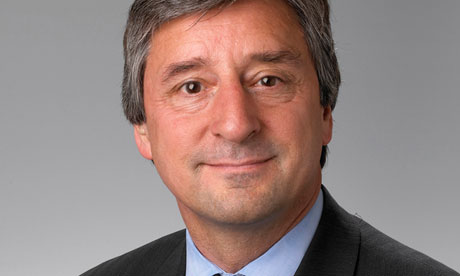 A senior Labour MP has resigned as a shadow minister after saying he would vote against Ed Miliband's policy on Syria. Jim Fitzpatrick quit after telling the Commons he was "opposed to military intervention in Syria, full stop". A senior Labour source said: "Jim Fitzpatrick has tonight handed in his resignation as shadow transport spokesman." Poplar and Limehouse MP Fitzpatrick told the Commons that, while Labour's position was "more honest and open and structured" than the government's motion approving the principle of military action against Syria, it still endorsed the potential use of force. "In terms of the opposition amendment – it's fair to say it's more honest and open and structured. But, from my reading, it essentially endorses the same principle: 'If we can address certain issues, if certain conditions are met, military action can happen'. I don't believe that it should under any circumstances." Fitzpatrick, a minister under Tony Blair and Gordon Brown, added: "My objection is not having an exit strategy, not having an end game. "There have been many contributions during the course of this debate today where colleagues have said 'If we do this, that will happen. If we don't do that, that will happen'. "There's only one thing which is absolutely guaranteed – nobody knows what's going to happen if we go down the road of military action. We've seen it too often in recent decades. The fact we don't have an exit strategy creates the difficulty I have. "In conclusion, I have problems both with the government motion and the opposition amendment. I do not believe either is able to achieve the honourable ends that both sides of this House are trying to achieve. I'm opposed to military intervention in Syria, full stop. "To be honest with myself, and consistent on both questions, I will be voting in the No lobby, against the government motion and against the opposition amendment." -- |
|
#12
|
||||
|
||||
|
Syria: UK intelligence blames Assad regime for chemical attacks
No 10 publishes assessment as MPs are put on notice they may have to return to Commons for weekend vote on military action 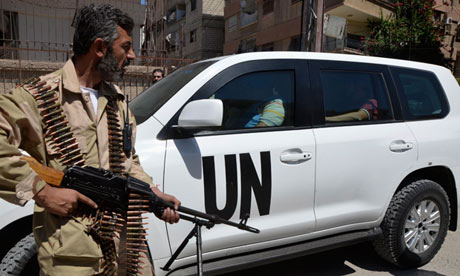 Britain's joint intelligence committee (JIC) has concluded it is "highly likely" that the regime of Bashar al-Assad was responsible for the chemical weapons attacks in Syria last week that have prompted moves towards launching military strikes. In an echo of the buildup to the Iraq war in 2003, Downing Street took the rare step of releasing the assessment of the JIC to support its case that the Assad regime was responsible. But the assessment was mainly based on "open source" evidence such as video footage of the victims and a judgment that the opposition does not have the capability to launch such an attack. Downing Street sources said the intelligence, outlined by David Cameron to Tory MPs at a Westminster meeting, presented a "compelling and conclusive" case of the involvement of the Assad regime in the chemical attack. MPs, who are due to hold an initial non-binding vote on Thursday night, are being put on notice that they may have to return to Westminster on Saturday or Sunday to authorise military action in a second vote. Tentative plans for the first weekend sitting of parliament since the Falklands war in 1982 are being made amid signs that the White House is willing to show Britain some flexibility but cannot wait indefinitely. One source said No 10 was now confident Cameron would win the vote on Thursday night after setting out the legal case and intelligence evidence to Conservative MPs during a pre-debate meeting. The source said MPs spoke out "overwhelming" in support of the government's motion approving "legal, proportionate" military action in Syria if necessary. "We're confident the argument is being made," the source said. The confidence in No 10 came as a report said the US evidence linking the Assad regime to the attack was no "slam dunk", and there remains uncertainty over real control over Syria's chemical weapons stockpiles. The Associated Press quoted "multiple US officials" as pointing towards gaps in the US intelligence picture, in strong contrast to the certainty expressed by American leaders, including Barack Obama. The AP said the US intelligence evidence against Syria was "thick with caveats". The questions over intelligence came as the British government tried to build support by releasing the JIC assessment and a statement based on the formal legal advice by the attorney general, Dominic Grieve, that limited military strikes to deter future chemical weapons attacks would be in line with international law. In its assessment of the chemical weapons attack the JIC said the regime had launched at least 14 chemical weapons attacks in the past. The assessment says: "It is not possible for the opposition to have carried out a CW attack on this scale. The regime has used CW on a smaller scale on at least 14 occasions in the past. There is some intelligence to suggest regime culpability in this attack. These factors make it highly likely that the Syrian regime was responsible." The JIC acknowledged that some of its assessment was based on "open source" evidence such as testimony from victims, doctors and video footage. But in a separate letter to Cameron the JIC chairman, Jon Day, said he had seen "highly sensitive" unpublished intelligence that supported their view that the regime had launched the attacks to clear the opposition from strategic parts of Damascus. The AP report says of the US intelligence: "It builds a case that Assad's forces are most likely responsible while outlining gaps in the US intelligence picture. US officials have publicly said that Washington's certainty about the regime's responsibility for the chemical attacks was based on its conviction that only the government had access to chemical weapons." The JIC assessment was released at the same time as a government statement on the legal advice from the attorney general. This said that military action would be legal "under the doctrine of humanitarian intervention". It also said action would be legal even without the authority of the UN security council. The statement said: "If action in the security council is blocked, the UK would still be permitted under international law to take exceptional measures in order to alleviate the scale of the overwhelming humanitarian catastrophe in Syria by deterring and disrupting the further use of chemical weapons by the Syrian regime. Such a legal basis is available, under the doctrine of humanitarian intervention." The Downing Street source said YouTube videos showed gas had been deployed against Syrian citizens. No 10's argument is that the use of chemical weapons has been overseen by the regime, whether or not the attacks were ordered by Assador "rogue elements", the Downing Street source said. There is palpable anger in No 10 about Ed Miliband's last-minute decision to oppose the government. A source said Cameron was determined to vote against Labour's motion because it "doesn't even condemn Assad". He also criticised Labour for raising a "red herring" after the opposition insisted Britain must wait for a report from UN weapons inspectors before acting against Syria. A No 10 spokesperson said: "The judgment of the joint intelligence committee is that a chemical weapons attack did occur in Damascus last week; that it is highly likely that the Syrian regime was responsible; that there is some intelligence to suggest regime culpability; and that no opposition group has the capability to conduct a chemical weapons attack on this scale. "The government's position on the legality of any action makes clear that if action in the UN security council is blocked, the UK would still be permitted, under the doctrine of humanitarian intervention, to take exceptional measures including targeted military intervention in order to alleviate the overwhelming humanitarian suffering in Syria. "The cabinet endorsed the recommendation from the national security council and the prime minister will set out the proposed government response in the house this afternoon. "Ministers agreed that it is fundamentally in our national interest to uphold the longstanding convention on chemical weapons and to make clear that they cannot be used with impunity. "Any response should be legal, proportionate and specifically in response to this attack and everyone around the cabinet table agreed that it is not about taking sides in the Syrian conflict nor about trying to determine the outcome." http://www.theguardian.com/world/201...emical-weapons |
|
#13
|
||||
|
||||
|
Syria, our amoral guardians, and the complete breakdown of trust
__________________
|
|
#14
|
||||
|
||||
|
Syria: No 10 accuses Ed Miliband of giving succour to Assad regime
Row erupts after Labour leader moves to block early Commons vote on military action 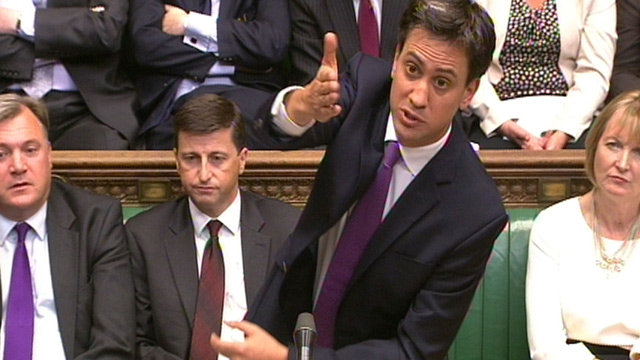 A furious row between Downing Street and the Labour leadership has erupted after No 10 accused Ed Miliband of giving "succour" to the Assad regime after he moved to block an early Commons vote on military action. As Cameron rejected a Labour amendment on Syria, the prime minister's spokesperson accused Miliband of "flipping and flopping" and of having moved the goalposts in negotiations over the past 48 hours. Asked whether Miliband was giving succour to the Assad regime, another Downing Street spokesperson said: "Yes. The fact is that a lot of the arguments over this could give succour to the regime." Labour on Thursday night alleged the controverisal remark was made by Cameron's director of communications, Craig Oliver, and the party wrote to Sir Jeremy Heywood, the cabinet secretary, to complain about No 10's "infantile" claim. Michael Dugher, the shadow Cabinet Office minister, wrote: "You will have noticed reports the director of government communications Craig Oliver has described the leader of opposition as giving 'succour to Assad'. It is language which is infantile and irresponsible. "It follows a pattern of behaviour by 10 Downing Street through recent days which demeans the office of prime minister. It is particularly disappointing given the serious nature of today's debate and the fact that throughout the country people will be listening with great concern about events in Syria, some knowing their relatives could soon be involved in military action. "We ask that Mr Oliver apologises and withdraws the remark. In view of the public interest in this matter we are releasing this letter to the media."  Ed Miliband was accused of 'flipping and flopping' and moving the goalposts over military action in Syria. Photograph: Reuters A Downing Street spokesperson said the letter to the cabinet secretary was "completely over the top". The spokesperson said: "Labour's reaction is completely over the top. The No 10 press people were asked if the lack of an international response could give succour to the regime and they agreed with that. They did not mention Ed Miliband by name." Ed Miliband was accused of 'flipping and flopping' and moving the goalposts over military action in Syria. Photograph: Reuters A Downing Street spokesperson said the letter to the cabinet secretary was "completely over the top". The spokesperson said: "Labour's reaction is completely over the top. The No 10 press people were asked if the lack of an international response could give succour to the regime and they agreed with that. They did not mention Ed Miliband by name."Miliband was already angry after a government source used expletives overnight to criticise Miliband. A government source told the Times on Wednesday night: "No 10 and the Foreign Office think Miliband is a ****ing cunt and a copper-bottomed shit." A Labour spokesman said of the attack on Miliband. "It seems to us that it is uncalled for. It is demeaning to the debate. There will be families up and down this country who are listening to this debate thinking that if there is military action it could be my son involved, it could be my father involved. "Downing Street should not lower itself to the level of personal abuse. David Cameron says he wants a consensual approach. His representatives are lowering themselves to a level that is uncalled for." The war of words between Labour and No 10 came after the prime minister rejected out of hand a Labour amendment that Miliband will press to a vote at 10pm on Thursday night after a lengthy debate in the Commons. Miliband is refusing to support a government motion, which includes his demand for a second vote to authorise military action, on the grounds that it fails to set out strong enough conditions for the involvement of UN weapons inspectors and the UN security council. But the prime minister made clear that he was prepared for a parliamentary showdown after he rejected the Labour amendment on the grounds that it failed to mention that chemical weapons were launched in the disputed attack east of Damascus on 21 August. He also said that Labour made no mention of the role of the Assad regime. The failure to reach agreement followed heated personal exchanges between Cameron and Miliband on Wednesday. Downing Street said that Miliband made no mention of his demand for a second vote at a face-to-face meeting on Wednesday. He made the demand in a later call. Labour confirmed that Miliband did not raise it on the grounds that he was listenting to the prime minister at their meeting. A N0 10 spokesperson said: "Ed Miliband is flipping and flopping and completely unable to make up his mind. He has been shifting the goalposts." But the prime minister admitted that a British military attack on Syria would have to be a "judgment call" as there was no "single smoking piece of intelligence" that the regime used chemical weapons. Speaking at the beginning of the emergency Commons debate on Syria, the prime minister said he believed that forces loyal to Bashar al-Assad did use poisonous gas against the Syrian people "right in front of our eyes". Cameron told MPs there were at least 95 "horrific videos" of people dying in a gas attack in a suburb of Damascus two weeks ago, and added there was further evidence in the form of eyewitness and social media reports. However, the prime minister did concede that there could be no 100% certainty about the intelligence on which Britain would have to make a decision on whether to intervene in Syria. Returning to first principles, Cameron argued it was in Britain's national interest to maintain the "international taboo" against the use of chemical weapons on the battlefield. He said the consequences of inaction would be greater than action, as it would give Assad a green light to commit more abuses. "We must not let the spectre of previous mistakes paralyse us," he added. He acknowledged people were sceptical about getting into "another war in the Middle East" after the actions of the Blair government in the runup to the 2003 Iraq war "well and truly poisoned the well of public opinion" about intervention on the basis of secret intelligence. But he insisted the situation was fundamentally different to Iraq. "I am of course deeply mindful of the lessons of previous conflicts and in particular the deep concerns in the country caused by what went wrong with the Iraq conflict in 2003," he told MPs during a packed House of Commons debate on the issue. "But this is not like Iraq. What we are seeing in Syria is fundamentally different," he said. "We are not invading a country. We are not searching for chemical or biological weapons. The case for ultimately, and I say ultimately because there would have to be another vote in this house, the case for ultimately supporting action is not based on a specific piece or pieces of intelligence." He said the government's motion was purely based on the argument that the world must not stand by while chemical weapons are used against civilians. "The motion also makes clear that, even if all these steps are taken, anything we do would have to be legal, proportionate and specifically focused on deterring further use of chemical weapons," he said. The prime minister promised he would wait until UN weapons inspectors had delivered their verdict before joining the US in any intervention. The inspectors are due to leave the country on Saturday and, it is understood, could deliver an interim report to the United Nations that day. He also said it would be "unthinkable" to proceed if the UN security council was overwhelmingly against an attack – although this was not thought to refer to Russian and Chinese objections. No military strike will take place without another vote by MPs in the House of Commons, Cameron added. "I wanted the recall of this house to debate these absolutely vital national and international issues," he said. "It is this house that will decide what steps we next take. If you agree to the motion I have set down no action can be taken until we have heard from the UN weapons inspectors, until there has been further action at the United Nations and another vote in this house. "Those are the conditions we the British government, the British parliament, are setting and it is absolutely right we do so." Ed Miliband said Cameron had not yet made a convincing enough case for a military strike on Syria. He said evidence published on Thursday by the joint intelligence committee was "important" but more was needed for it to be conclusive. The Labour leader made it clear he was not opposed to action in principle but wanted more time and better arguments before his MPs would give the coalition their backing. The prime minister must make "a better case than he did today", he added. 00 |
|
#15
|
||||
|
||||
|
Syria: it takes more courage to say there is nothing outsiders can do
The human misery in Syria is agonising to watch. But intervention-lite is a bad idea for all but the politicians' egos 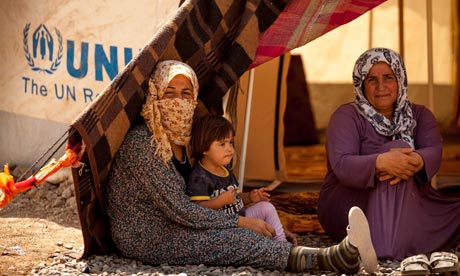 The urge of much of Britain's political establishment to attack Syria is in retreat. The prime minister's eagerness to join an American bombing run on Damascus hit a humiliating reverse in the Commons on Thursday evening. The prime minister now appears to accept there will be no British intervention in Syria. Prior to the vote, Downing Street had been swerving and skidding to avoid the Iraq trap. It wisely published the intelligence report indicating the Assad regime used chemical weapons in a raid on a Damascus suburb, possibly in random retaliation for an attempt on his life. Such weapons are illegal under international law. While it was wrong to rush to judgment with inquiries still in train, there is justice in a desire to enforce the law. But enforcement must be meticulous in its legality. Otherwise what is dispensed is anarchy, not law. The government claimed it could attack Syria under the UN's "responsibility to protect" doctrine, where people in a foreign state are abused by their own government. We know from the Iraq invasion that British politicians are adept at finding lawyers to say what they want. But facts are facts. The UN's resolution 1674 on responsibility to protect plainly states that such action must be "through the security council in accordance with the charter". That process was absent. The use of chemical weapons is awful. But to treat their apparently random use to justify an urgent, extra-legal attack on a foreign state is wilful. It had been precipitated by President Obama's unwise warning in the summer that such use would cross a "red line". This is odd from a leader whose own arsenal embraces phosphorous and depleted uranium shells and delayed-action cluster bombs, not to mention nuclear weapons. Why such dreadful weapons are not taboo, and chemical ones are, is a mystery. Obama's intention is currently for a "limited, tailored … clear, decisive shot across the bows" of the Syrian government. The tactical basis for this is obscure. It can hardly claim to deter a chemical attack, since the red line speech tried and failed in that respect. While Assad seems unlikely to repeat the outrage, the idea that he will roll over if bombed and stop killing his people is naive. As for "degrading" his arsenals, if this releases chemical clouds how stupid is that? The likelihood is now of a single burst of destruction by US forces if only and blood-letting, to assuage the do-something lobby. This can hardly alter the balance in the civil war, though it seems certain to increase the refugee flow, alienate Russia and its regional allies, and infuriate a newly moderate Iran. All this is to "punish a dictator" in what seems depressingly like a gesture to allow western politicians to strut tall and feel good. Something-must-be-done wars have a long and wretched history, notably in the Middle East. It was after Ronald Reagan saw television footage of the Sabra and Shatila massacres in 1982 that he ordered his marines into Beirut. He later withdrew them, leaving 265 American dead and Lebanon with a further decade of ghastly civil conflict. In 1986, the US tried to kill Libya's Colonel Gaddafi over a terrorist attack in Berlin, merely ensuring a further burst of Gaddafi-sponsored terrorism. In ***ovo in 1999, the Nato bombing of Belgrade did nothing to impede ethnic cleansing, indeed it probably expedited it. What tipped the Russians into forcing Serbia to back down was the threat of a western land invasion. In 1993, President Clinton bombed Baghdad in retaliation for a claimed plot to kill former president George H Bush. This was followed five years later by the further bombing of Iraq in Operation Desert Fox, this time to deflect attention from the Monica Lewinsky affair. Its declared purpose of eliminating weapons of mass destruction was so botched as to require more bombing and the eventual invasion in 2003. Then as now, the zest for aggression seemed driven as much by the military-industrial complex as by legality or evidence. Overstating the military and political potency of air power – mostly as a "sending of messages" – is as old as air war itself. Tactical bombing is occasionally effective where, as in Libya and initially in Afghanistan, it is in close support of ground forces. When, as now, it is intended as a soft option to ground action, it merely destroys. The one sound strategic reason for intervening in Syria would be to topple President Assad. Cameron was unable to tell the Commons how raining bombs on Damascus contributed to this perhaps as advice was that this might be illegal. The idea that a region afflicted by decades of sectarian conflict will be driven to peace and democracy by a few Tomahawk missiles is absurd. And who was it that Cameron wanted to see take over? Hezbollah or a new (and probably no less brutal) Sunni supremacy? The desire to re-order foreign states – still embedded in parts of the British establishment – has long been subsumed in the constitution of the UN and international courts of justice. These may seem imperfect, but they are how the world has agreed to legitimise actions that infringe the integrity of independent independent countries. When Britain went to war in Kuwait, the Falklands and Libya, it did so with proper UN legal cover. The Syrian civil war is awful to witness but not exceptional. The Lebanese civil war next door claimed 120,000 lives and created millions of refugees. The Iraq war, a similar sectarian conflict, claimed even more lives and continues to do so. Sometimes it takes courage to conclude of foreign conflicts that we can only do more harm than good by meddling in them. But the idea that not meddling constitutes "allowing them" to continue is a short route to madness. The logic of most civil wars is that they end either when the combatants fight each other to exhaustion, or when some neighbouring power invades and quashes them. Dropping a few bombs would have been the nearest the British government got to Cameron's own charge of "standing idly by". It would have been careless of outcome, halfhearted intervention, intervention-lite. In Syria the human misery is intense and agonising to watch. It merits extremes of diplomatic engagement and humanitarian relief, to which outside attention and expense should surely be directed. Bombs are irrelevant. They make a bang and hit a headline. They puff up the political chest and dust their advocates in glory. They are the dumbest manifestation of modern politics. 000 |
| العلامات المرجعية |
«
الموضوع السابق
|
الموضوع التالي
»
|
|
جميع الأوقات بتوقيت GMT +2. الساعة الآن 02:08 PM.




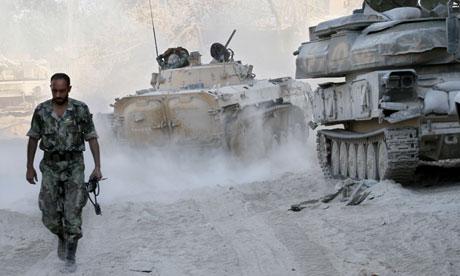


 العرض العادي
العرض العادي

